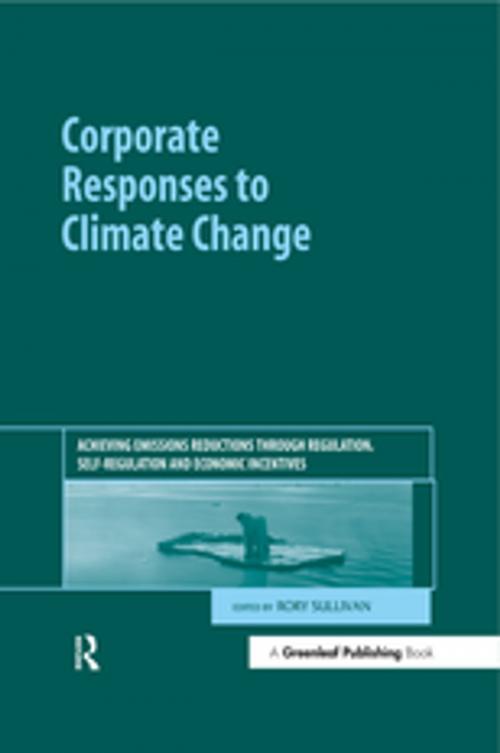Corporate Responses to Climate Change
Achieving Emissions Reductions through Regulation, Self-regulation and Economic Incentives
Business & Finance, Business Reference, Business Ethics, Management & Leadership, Planning & Forecasting| Author: | Rory Sullivan | ISBN: | 9781351279987 |
| Publisher: | Taylor and Francis | Publication: | September 8, 2017 |
| Imprint: | Routledge | Language: | English |
| Author: | Rory Sullivan |
| ISBN: | 9781351279987 |
| Publisher: | Taylor and Francis |
| Publication: | September 8, 2017 |
| Imprint: | Routledge |
| Language: | English |
Given the scale of the greenhouse gas emissions reductions that are seen as necessary to avert the worst effects of climate change, policy action is likely to result in a complete reshaping of the world economy. The consequences are not confined to 'obvious' sectors such as power generation, transport and heavy industry; virtually every company's activities, business models and strategies will need to be completely rethought. In addition, beyond their core business activities, companies have the potential to make important contributions to reducing greenhouse gas emissions through the allocation of capital, through innovation and the development of new technologies, and through their influence on the actions taken by governments on climate change.
Corporate Responses to Climate Change has been written at a crucial point in the climate change debate, with the issue now central to economic and energy policy in many countries. The book analyses current business practice and performance on climate change, in the light of the dramatic changes in the regulatory and policy environment over the last five years. More specifically, it examines how climate change-related policy development and implementation have influenced corporate performance, with the objective of using this information to consider how the next stage of climate change policy – regulation, incentives, voluntary initiatives – may be designed and implemented in a manner that delivers the real and substantial reductions in greenhouse gas emissions that will be required in a timely manner, while also addressing the inevitable dilemmas at the heart of climate change policy (e.g. how are concerns such as energy security to be squared with the need for drastic reductions in greenhouse gas emissions? Can economic growth be reconciled with greenhouse gas emissions? Can emissions reductions be delivered in an economically efficient manner?).
The book focuses primarily on two areas. First, how have companies actually responded to the emerging regulatory framework and the growing political and broader public interest in climate change? Have companies reduced their greenhouse gas emissions and by how much? Have companies already started to position themselves for the transition to a low-carbon economy? Does corporate self-regulation – unilateral commitments and collective voluntary approaches – represent an appropriate response to the threat presented by climate change? What are the barriers to further action? Second, the book examines what the key drivers for corporate action on climate change have been: regulation, stakeholder pressure, investor pressure. Which policy instruments have been effective, which have not, and why? How have company actions influenced the strength of these pressures?
Corporate Responses to Climate Change is a state-of-the-art analysis of corporate action on climate change and will be essential reading for businesses, policy-makers, academics, NGOs, investors and all those interested in how the business sector is and should be dealing with the most serious environmental threat faced by our planet.
Given the scale of the greenhouse gas emissions reductions that are seen as necessary to avert the worst effects of climate change, policy action is likely to result in a complete reshaping of the world economy. The consequences are not confined to 'obvious' sectors such as power generation, transport and heavy industry; virtually every company's activities, business models and strategies will need to be completely rethought. In addition, beyond their core business activities, companies have the potential to make important contributions to reducing greenhouse gas emissions through the allocation of capital, through innovation and the development of new technologies, and through their influence on the actions taken by governments on climate change.
Corporate Responses to Climate Change has been written at a crucial point in the climate change debate, with the issue now central to economic and energy policy in many countries. The book analyses current business practice and performance on climate change, in the light of the dramatic changes in the regulatory and policy environment over the last five years. More specifically, it examines how climate change-related policy development and implementation have influenced corporate performance, with the objective of using this information to consider how the next stage of climate change policy – regulation, incentives, voluntary initiatives – may be designed and implemented in a manner that delivers the real and substantial reductions in greenhouse gas emissions that will be required in a timely manner, while also addressing the inevitable dilemmas at the heart of climate change policy (e.g. how are concerns such as energy security to be squared with the need for drastic reductions in greenhouse gas emissions? Can economic growth be reconciled with greenhouse gas emissions? Can emissions reductions be delivered in an economically efficient manner?).
The book focuses primarily on two areas. First, how have companies actually responded to the emerging regulatory framework and the growing political and broader public interest in climate change? Have companies reduced their greenhouse gas emissions and by how much? Have companies already started to position themselves for the transition to a low-carbon economy? Does corporate self-regulation – unilateral commitments and collective voluntary approaches – represent an appropriate response to the threat presented by climate change? What are the barriers to further action? Second, the book examines what the key drivers for corporate action on climate change have been: regulation, stakeholder pressure, investor pressure. Which policy instruments have been effective, which have not, and why? How have company actions influenced the strength of these pressures?
Corporate Responses to Climate Change is a state-of-the-art analysis of corporate action on climate change and will be essential reading for businesses, policy-makers, academics, NGOs, investors and all those interested in how the business sector is and should be dealing with the most serious environmental threat faced by our planet.















